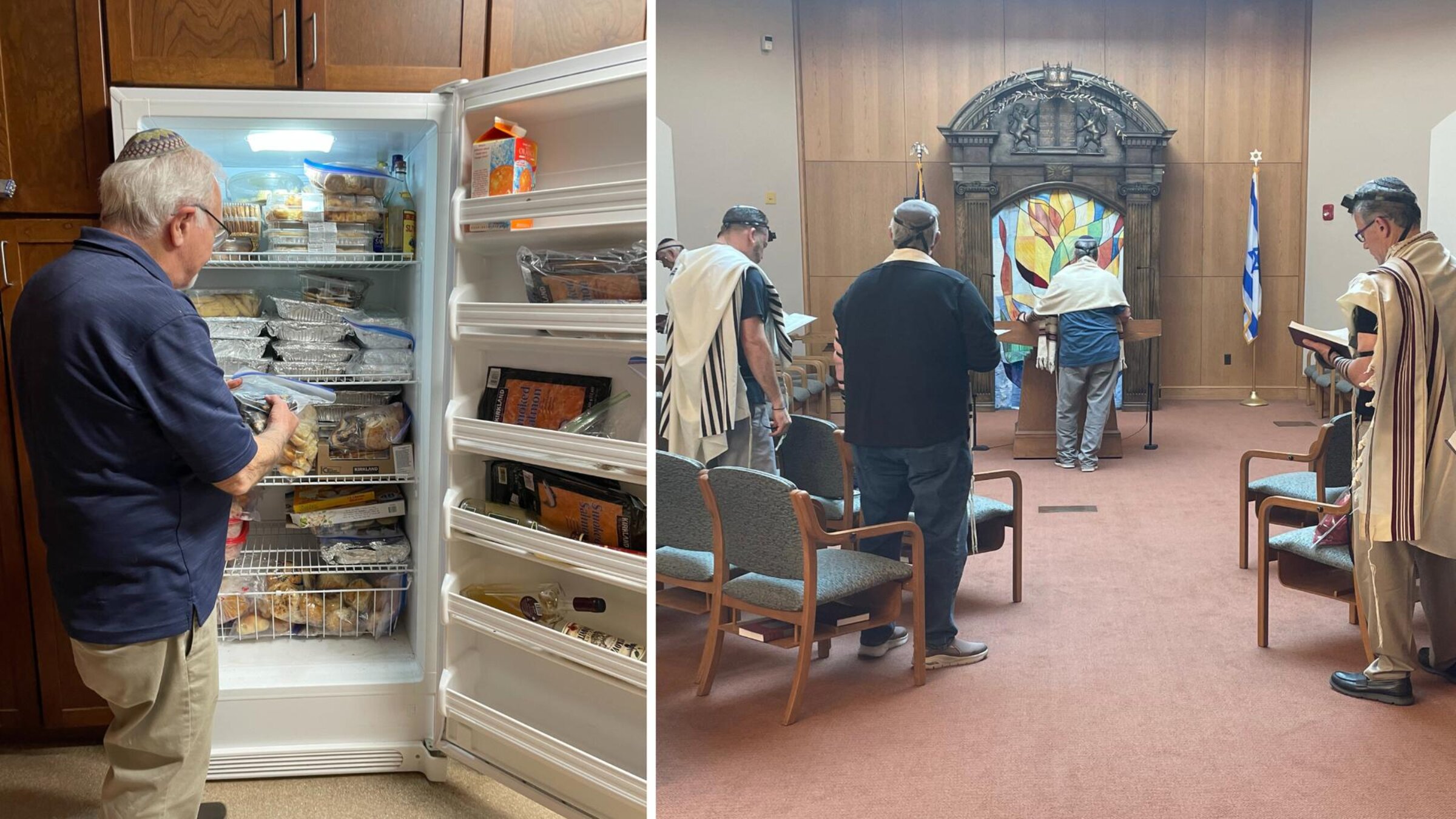Mine has been an itinerant mourning. There is no reliable egalitarian daily minyan near my home in Montclair, N.J., so most weeks since my father died in February I say kaddish in at least four different synagogues, in-person or via Zoom. I’ve visited 18 overall, so far.
When I visited my mom in Newton last month, I faced a dilemma: Should I daven at the modern Orthodox shul my dad helped found, the place where he said kaddish for his own mother and was a staple of the morning minyan for many years — but where seating is segregated by gender and women do not count for the required prayer quorum? I decided instead to try Emanuel, where I had not set foot since high school.
What I found there was remarkable. Every minyan I have visited has been welcoming, but this one is truly thriving. Instead of the awkward worrying over will-we-get-to-10-people-in-time-for-the-first-kaddish that I’ve experienced in several places, in my five mornings at Emanuel over two months, there were never fewer than 25.
And it’s … fun. Minyan starts at 7 a.m. but people show up as early as 6, ostensibly to help set up but really to schmooze. You can get tips on where to buy appliances; hear about one guy’s cruise to Alaska and another’s grandson’s eighth-grade graduation in California; learn what books are popular at a Little Free Library; trade Trump jokes; or share the last days of a lost loved one.
That was on a single morning. “Services really get in the way,” one regular joked as he headed in, a few minutes late. “If they have 10, we’ll come back.”
The services are lovely, too. A little less singing than I’d like, but with a broad rotation of lay leaders, a good pace. Though “if a stranger came, they’d be confused,” Gordon noted one morning, “because people get up to leave in the middle of services.”
He had ducked out just after barchu, one of the morning focal points, and was walking out of the minyan kitchen — yes, they have their own kitchen — only to run into Gann in the hallway.
“I did it already,” he said.
“You put the bagels in?” she asked.
Yep, he said.
“You put out the coffee?” Yep.
“Stirred the oatmeal?” Yep.
Soon we were all back in our seats, saying the shema.
It’s hard to know whether the size and strength of this minyan is unique, in a Conservative movement that has been shrinking for years, or a window into some kind of resurgence around non-Orthodox daily prayer. My sister’s minyan, at Adas Israel Congregation in Washington, D.C., also has breakfast every day, though it is usually just bagels and schmear. At B’nai Jeshurun on Manhattan’s Upper West Side, I’m among several dozen Zoomers each day, many of them women like me saying kaddish for a lost parent.
At Emanuel, the minyan is a sub-community, where regulars pay $15 a month or $180 a year, to offset the catered platters and Costco runs. Over the years, the group has also made donations to the synagogue — of playground equipment for the preschool, a Torah.
When it snows, one couple has been known to arrive on skis. The only time anyone remembers minyan being canceled is the week of the Boston Marathon bombing in 2013, when Rabbi Wes Gardenswartz burst in to say they had to clear the building because the brothers suspected of the crime were engaged in a shootout with police in neighboring Watertown.
Yael Biniamini, 65, an Israeli ex-pat who lives alone, said she has not missed a morning since the minyan re-opened in-person in March 2021. She walks the half-mile each way.
“I had been sick with pneumonia, and needed a reason to get up in the morning,,” she said. “I don’t have a family, so now I have community.”
A lifelong family friend of mine, Joan Mael, who works at Emanuel, was recently housebound with health issues. Minyan members brought her breakfast every day — for a full year.
The whole breakfast thing began back in the 1950s, they told me. Lewis Lourie, who was the temple’s ritual director at the time, started putting out food each morning; his wife, Frummie, made French toast on Mondays and Thursdays, when the services are longer because they include Torah reading. After the Louries moved to Israel in 1986, civilians picked up the slack in the kitchen and a man named Irving Gordon, who had grown up Orthodox, took the reins in the chapel.
He taught many women to lead services, training one to chant Torah during her chemotherapy treatments. When he died, he gave a minyan member his worn Tikkun, the book used to prepare Torah readings.
These days, Jerry Gordon, Rita Gann, their spouses and a few others are the pillars of the place. There’s a calendar demarcating who is supposed to arrive first on which day, to turn off the alarm and start the oatmeal — 65 minutes in a rice cooker — but most of them come, early, on most days. They each started when they were saying kaddish for a parent, and then … stayed.
“What brings us here is the davening and the quiet in the chapel,” explained Phyllis Gordon, Jerry’s wife. “What keeps us here is the community.”
Lynn Segal, 66, who runs a health-care company, is nearing the end of her 11 months mourning her mother, who died in August. She expects to keep coming.
“The deal is — I mean nobody enforces it but everybody knows — you come to say kaddish, and then you pick a day and you show up on that day,” Segal explained. “So other people can say kaddish.”
